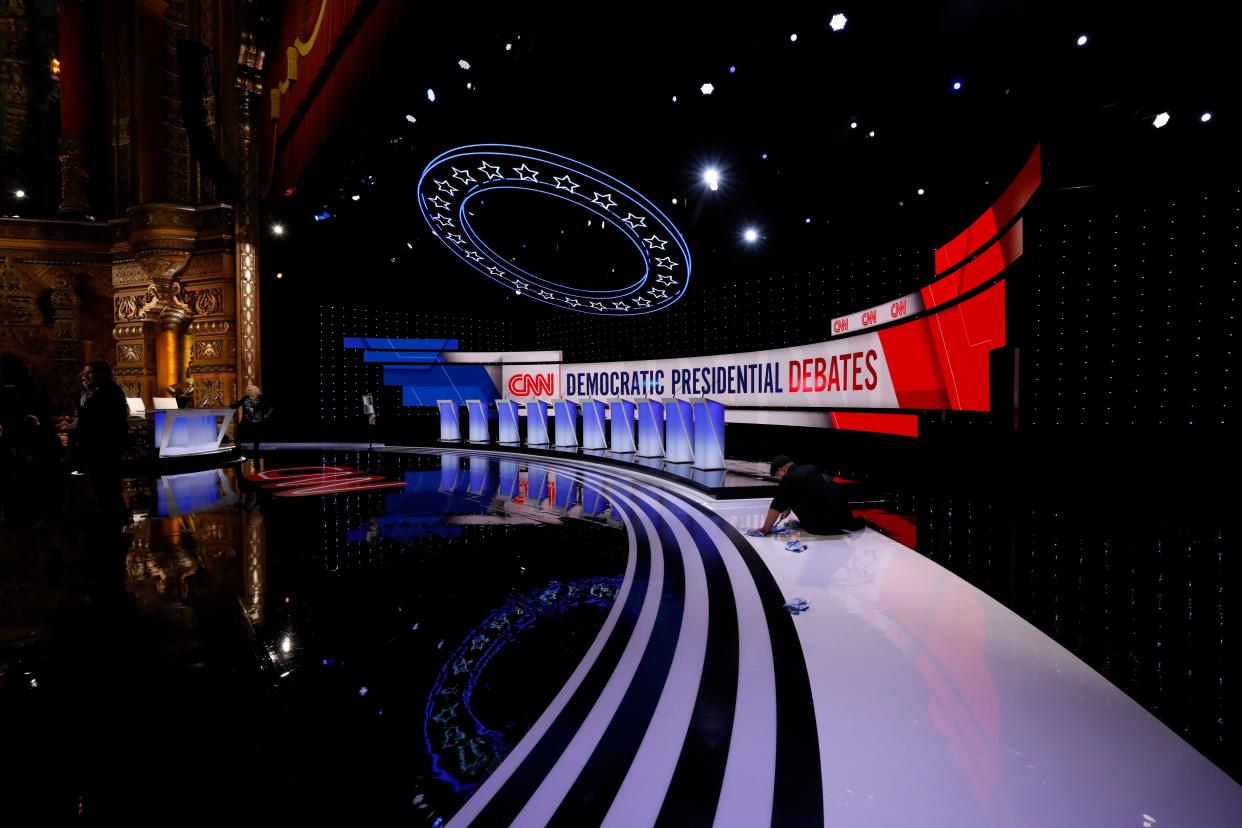Field for next Dem debate narrows to 10
With the deadline past for qualifying for the Sept. 12 Democratic debate, the lineup has been set as of Thursday morning, with the large field slimmed down to 10 candidates sharing a single stage, based on criteria set by the Democratic National Committee.
The lineup that will gather in Houston consists of former Vice President Joe Biden; Sens. Bernie Sanders, Elizabeth Warren, Kamala Harris, Cory Booker and Amy Klobuchar; South Bend, Ind., Mayor Pete Buttigieg; former Housing and Urban Development Secretary Julián Castro; former Rep. Beto O’Rourke; and entrepreneur Andrew Yang. New York Sen. Kirsten Gillibrand said late on Wednesday she would drop out of the race as a result of failing to qualify. Ten other Democrats are still running, including author Marianne Williamson and New York City Mayor Bill de Blasio, but face long odds.
ABC News had said that if more than 10 candidates qualified, it would split the field into two nights with the contenders randomly assigned. Billionaire investor Tom Steyer and Rep. Tulsi Gabbard of Hawaii both reached the threshold of 130,000 donors but fell, respectively, one and two surveys short of the polling requirement of 2 percent support in at least four recognized polls. The DNC set a deadline of midnight Wednesday, Aug. 28, for qualifying. Two new polls were released Wednesday morning, but Steyer and Gabbard didn’t hit 2 percent in either of them.

Those who failed to qualify for September’s debate will still have an opportunity to make the stage in October.
DNC Chair Tom Perez has made it clear that the bar for entry will continue to rise, which means that October’s debates could be the last for many of the candidates. The current standards for the September and October fields are both 130,000 donors and four qualifying polls, up from the 65,000 donors or 1 percent in three polls that allowed candidates into the first two rounds of debates.
The biggest story line next month will likely be Warren, who has traded second place with Sanders over the past month, sharing the stage with the frontrunner, Biden. The two appeared on different nights in the split debates held in June and July. They have a long history of disputes over bankruptcy law that predate Warren’s time in the Senate. Warren also had contemporaneous issues with a number of decisions made by the Obama White House, including the bank bailout and trade policy, but will have to balance criticism of Biden with Obama’s sky-high approval rating among Democrats. She also will be facing Harris directly for the first time. The California senator’s performance in the first debate won her a bump in polling, but that has since faded.
The DNC’s process has been criticized by many of the candidates who failed to qualify for this round of debates. Montana Gov. Steve Bullock knocked Steyer’s massive spending on social media, which helped him reach the donor threshold.
“We’re kidding ourselves if we’re calling a $10 million purchase of 130,000 donors a demonstration of grassroots support,” Bullock said. “It’s not serving the candidates, and it sure isn’t helping the voters who will actually decide this election.”
Sen. Michael Bennet of Colorado said the DNC was stifling debate and rewarding “celebrity candidates,” although it was unclear which of the 10 qualified candidates — nine sitting or former Democratic officials and an entrepreneur running on universal basic income — he was referring to as celebrities. Bennet participated in the first two debates, but his centrist messaging did not earn him a meaningful boost in polling or donations.
“It’s up to the candidates, at a certain point, to demonstrate that they’re gaining traction,” said Perez in response to the complaints. “I’ve heard criticism that the grassroots fundraising threshold forced people to spend money digitally. Well, Mayor Pete didn’t have to spend much money.”
Three candidates who were going to miss the debate stage dropped out in August: Gov. Jay Inslee of Washington, Rep. Seth Moulton of Massachusetts and former Colorado Gov. John Hickenlooper. Inslee and Moulton are intending to run for reelection in 2020, while Hickenlooper has shifted his focus to Republican Cory Gardner’s Senate seat, also up in November of next year.
Previous debates haven’t had much lasting impact on the polls, but things could change with all the top candidates on the same stage. The last round of national polling has shown similar results, with Biden comfortably in first and Sanders and Warren the nearest competitors. Harris and Buttigieg have seen their polling slump, with neither cracking double digits in a DNC-approved national poll since Harris reached 12 percent in a Quinnipiac survey in late July. O’Rourke’s candidacy has also flagged, trailing Yang in all three polls released this week.
_____
Download the Yahoo News app to customize your experience.
Read more from Yahoo News:

